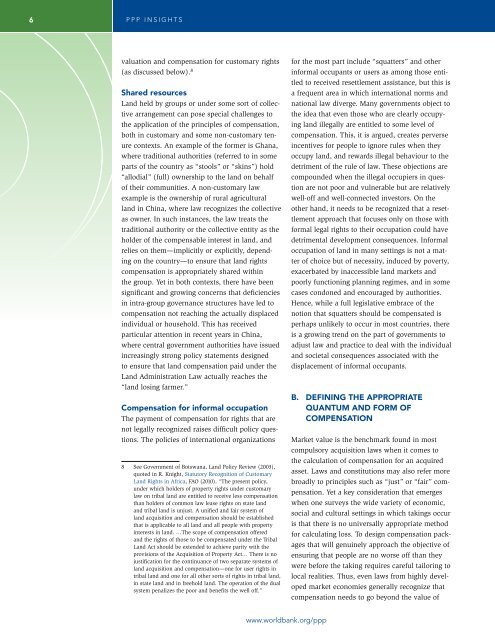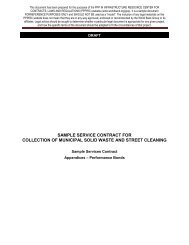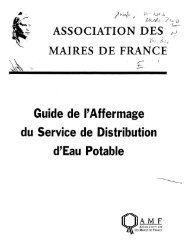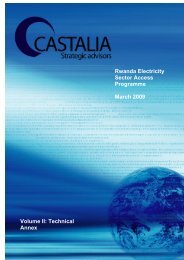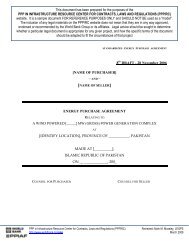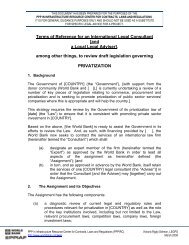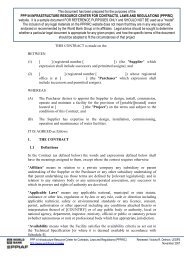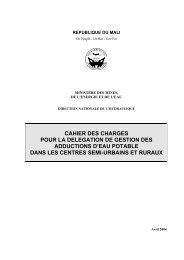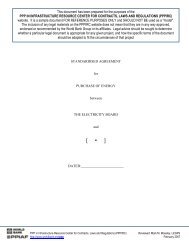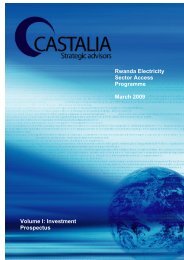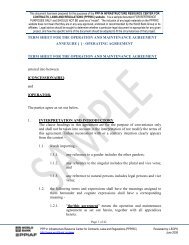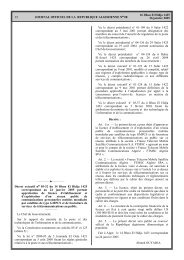Compulsory Acquisition of Land and Compensation in Infrastructure ...
Compulsory Acquisition of Land and Compensation in Infrastructure ...
Compulsory Acquisition of Land and Compensation in Infrastructure ...
You also want an ePaper? Increase the reach of your titles
YUMPU automatically turns print PDFs into web optimized ePapers that Google loves.
6 PPP Insights<br />
valuation <strong>and</strong> compensation for customary rights<br />
(as discussed below). 8<br />
Shared resources<br />
<strong>L<strong>and</strong></strong> held by groups or under some sort <strong>of</strong> collective<br />
arrangement can pose special challenges to<br />
the application <strong>of</strong> the pr<strong>in</strong>ciples <strong>of</strong> compensation,<br />
both <strong>in</strong> customary <strong>and</strong> some non-customary tenure<br />
contexts. An example <strong>of</strong> the former is Ghana,<br />
where traditional authorities (referred to <strong>in</strong> some<br />
parts <strong>of</strong> the country as “stools” or “sk<strong>in</strong>s”) hold<br />
“allodial” (full) ownership to the l<strong>and</strong> on behalf<br />
<strong>of</strong> their communities. A non-customary law<br />
example is the ownership <strong>of</strong> rural agricultural<br />
l<strong>and</strong> <strong>in</strong> Ch<strong>in</strong>a, where law recognizes the collective<br />
as owner. In such <strong>in</strong>stances, the law treats the<br />
traditional authority or the collective entity as the<br />
holder <strong>of</strong> the compensable <strong>in</strong>terest <strong>in</strong> l<strong>and</strong>, <strong>and</strong><br />
relies on them—implicitly or explicitly, depend<strong>in</strong>g<br />
on the country—to ensure that l<strong>and</strong> rights<br />
compensation is appropriately shared with<strong>in</strong><br />
the group. Yet <strong>in</strong> both contexts, there have been<br />
significant <strong>and</strong> grow<strong>in</strong>g concerns that deficiencies<br />
<strong>in</strong> <strong>in</strong>tra-group governance structures have led to<br />
compensation not reach<strong>in</strong>g the actually displaced<br />
<strong>in</strong>dividual or household. This has received<br />
particular attention <strong>in</strong> recent years <strong>in</strong> Ch<strong>in</strong>a,<br />
where central government authorities have issued<br />
<strong>in</strong>creas<strong>in</strong>gly strong policy statements designed<br />
to ensure that l<strong>and</strong> compensation paid under the<br />
<strong>L<strong>and</strong></strong> Adm<strong>in</strong>istration Law actually reaches the<br />
“l<strong>and</strong> los<strong>in</strong>g farmer.”<br />
<strong>Compensation</strong> for <strong>in</strong>formal occupation<br />
The payment <strong>of</strong> compensation for rights that are<br />
not legally recognized raises difficult policy questions.<br />
The policies <strong>of</strong> <strong>in</strong>ternational organizations<br />
8 See Government <strong>of</strong> Botswana, <strong>L<strong>and</strong></strong> Policy Review (2003),<br />
quoted <strong>in</strong> R. Knight, Statutory Recognition <strong>of</strong> Customary<br />
<strong>L<strong>and</strong></strong> Rights <strong>in</strong> Africa, FAO (2010). “The present policy,<br />
under which holders <strong>of</strong> property rights under customary<br />
law on tribal l<strong>and</strong> are entitled to receive less compensation<br />
than holders <strong>of</strong> common law lease rights on state l<strong>and</strong><br />
<strong>and</strong> tribal l<strong>and</strong> is unjust. A unified <strong>and</strong> fair system <strong>of</strong><br />
l<strong>and</strong> acquisition <strong>and</strong> compensation should be established<br />
that is applicable to all l<strong>and</strong> <strong>and</strong> all people with property<br />
<strong>in</strong>terests <strong>in</strong> l<strong>and</strong>. …The scope <strong>of</strong> compensation <strong>of</strong>fered<br />
<strong>and</strong> the rights <strong>of</strong> those to be compensated under the Tribal<br />
<strong>L<strong>and</strong></strong> Act should be extended to achieve parity with the<br />
provisions <strong>of</strong> the <strong>Acquisition</strong> <strong>of</strong> Property Act… There is no<br />
justification for the cont<strong>in</strong>uance <strong>of</strong> two separate systems <strong>of</strong><br />
l<strong>and</strong> acquisition <strong>and</strong> compensation—one for user rights <strong>in</strong><br />
tribal l<strong>and</strong> <strong>and</strong> one for all other sorts <strong>of</strong> rights <strong>in</strong> tribal l<strong>and</strong>,<br />
<strong>in</strong> state l<strong>and</strong> <strong>and</strong> <strong>in</strong> freehold l<strong>and</strong>. The operation <strong>of</strong> the dual<br />
system penalizes the poor <strong>and</strong> benefits the well <strong>of</strong>f.”<br />
for the most part <strong>in</strong>clude “squatters” <strong>and</strong> other<br />
<strong>in</strong>formal occupants or users as among those entitled<br />
to received resettlement assistance, but this is<br />
a frequent area <strong>in</strong> which <strong>in</strong>ternational norms <strong>and</strong><br />
national law diverge. Many governments object to<br />
the idea that even those who are clearly occupy<strong>in</strong>g<br />
l<strong>and</strong> illegally are entitled to some level <strong>of</strong><br />
compensation. This, it is argued, creates perverse<br />
<strong>in</strong>centives for people to ignore rules when they<br />
occupy l<strong>and</strong>, <strong>and</strong> rewards illegal behaviour to the<br />
detriment <strong>of</strong> the rule <strong>of</strong> law. These objections are<br />
compounded when the illegal occupiers <strong>in</strong> question<br />
are not poor <strong>and</strong> vulnerable but are relatively<br />
well-<strong>of</strong>f <strong>and</strong> well-connected <strong>in</strong>vestors. On the<br />
other h<strong>and</strong>, it needs to be recognized that a resettlement<br />
approach that focuses only on those with<br />
formal legal rights to their occupation could have<br />
detrimental development consequences. Informal<br />
occupation <strong>of</strong> l<strong>and</strong> <strong>in</strong> many sett<strong>in</strong>gs is not a matter<br />
<strong>of</strong> choice but <strong>of</strong> necessity, <strong>in</strong>duced by poverty,<br />
exacerbated by <strong>in</strong>accessible l<strong>and</strong> markets <strong>and</strong><br />
poorly function<strong>in</strong>g plann<strong>in</strong>g regimes, <strong>and</strong> <strong>in</strong> some<br />
cases condoned <strong>and</strong> encouraged by authorities.<br />
Hence, while a full legislative embrace <strong>of</strong> the<br />
notion that squatters should be compensated is<br />
perhaps unlikely to occur <strong>in</strong> most countries, there<br />
is a grow<strong>in</strong>g trend on the part <strong>of</strong> governments to<br />
adjust law <strong>and</strong> practice to deal with the <strong>in</strong>dividual<br />
<strong>and</strong> societal consequences associated with the<br />
displacement <strong>of</strong> <strong>in</strong>formal occupants.<br />
b. Def<strong>in</strong><strong>in</strong>g the appropriate<br />
quantum <strong>and</strong> form <strong>of</strong><br />
compensation<br />
Market value is the benchmark found <strong>in</strong> most<br />
compulsory acquisition laws when it comes to<br />
the calculation <strong>of</strong> compensation for an acquired<br />
asset. Laws <strong>and</strong> constitutions may also refer more<br />
broadly to pr<strong>in</strong>ciples such as “just” or “fair” compensation.<br />
Yet a key consideration that emerges<br />
when one surveys the wide variety <strong>of</strong> economic,<br />
social <strong>and</strong> cultural sett<strong>in</strong>gs <strong>in</strong> which tak<strong>in</strong>gs occur<br />
is that there is no universally appropriate method<br />
for calculat<strong>in</strong>g loss. To design compensation packages<br />
that will genu<strong>in</strong>ely approach the objective <strong>of</strong><br />
ensur<strong>in</strong>g that people are no worse <strong>of</strong>f than they<br />
were before the tak<strong>in</strong>g requires careful tailor<strong>in</strong>g to<br />
local realities. Thus, even laws from highly developed<br />
market economies generally recognize that<br />
compensation needs to go beyond the value <strong>of</strong><br />
www.worldbank.org/ppp


